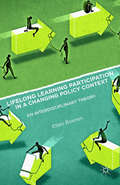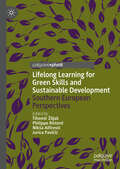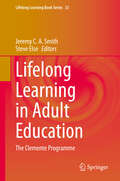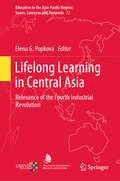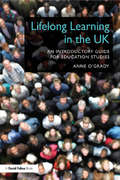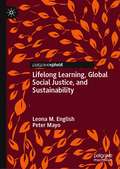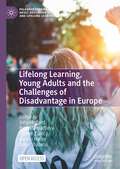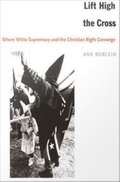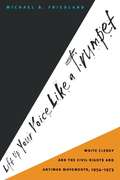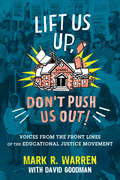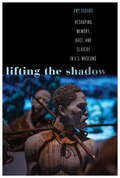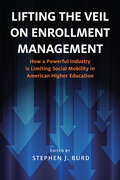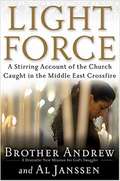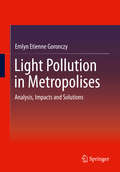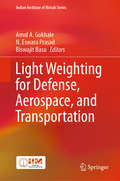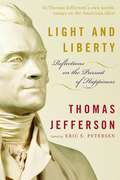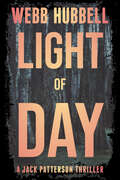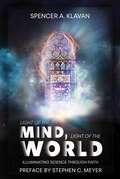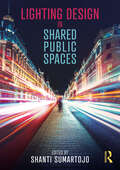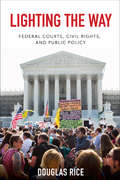- Table View
- List View
Lifeblood: Oil, Freedom, and the Forces of Capital (A Quadrant Book)
by Matthew T. HuberIf our oil addiction is so bad for us, why don&’t we kick the habit? Looking beyond the usual culprits—Big Oil, petro-states, and the strategists of empire—Lifeblood finds a deeper and more complex explanation in everyday practices of oil consumption in American culture. Those practices, Matthew T. Huber suggests, have in fact been instrumental in shaping the broader cultural politics of American capitalism.How did gasoline and countless other petroleum products become so central to our notions of the American way of life? Huber traces the answer from the 1930s through the oil shocks of the 1970s to our present predicament, revealing that oil&’s role in defining popular culture extends far beyond material connections between oil, suburbia, and automobility. He shows how oil powered a cultural politics of entrepreneurial life—the very American idea that life itself is a product of individual entrepreneurial capacities. In so doing he uses oil to retell American political history from the triumph of New Deal liberalism to the rise of the New Right, from oil&’s celebration as the lifeblood of postwar capitalism to increasing anxieties over oil addiction.Lifeblood rethinks debates surrounding energy and capitalism, neoliberalism and nature, and the importance of suburbanization in the rightward shift in American politics. Today, Huber tells us, as crises attributable to oil intensify, a populist clamoring for cheap energy has less to do with American excess than with the eroding conditions of life under neoliberalism.
Lifeboat
by James White[from the back cover:] "Disaster! The passengers were the usual varied lot, some nervous, some boisterous, some smart-aleck, some quiet. The ship's Medical Officer was brand new and didn't anticipate having to do much more than take care of a few queasy stomachs and bruises among his charges--from learning how to handle weightlessness. It was a routine trip. And so was the safety drill. Until the disaster call went out... " If you enjoyed this suspenseful novel about humanity's adjusting to life beyond earth in the future you'll enjoy the many more books by James White in the Bookshare collection.
Lifelong Learning Participation in a Changing Policy Context: An Interdisciplinary Theory
by Ellen BoerenDrawing on the role of individuals, education and training providers and countries' social policy actions, and borrowing insights from psychology, sociology and economics, this book works towards an interdisciplinary theory of adult lifelong learning participation. It explores the fragmented evidence of why adults do or do not participate in adult lifelong learning activities and focuses on the relevance of policy, the social character and expected benefits of lifelong learning participation and discusses the potential implications for policy, practice and research.
Lifelong Learning for Green Skills and Sustainable Development: Southern European Perspectives
by Nikša Alfirević Jurica Pavičić Tihomir Žiljak Philippe RistordThis edited book analyses the implementation of green transformation policies and the UN Sustainable Development Goals across the European Union, in the context of lifelong learning and educational practices. The contributions examine how green skills became mainstreamed in member states’ education policies, as well as the social, economic and political circumstances contributing to this process. A focus on lifelong learning (from an early age to adulthood) is maintained throughout the volume, and the book will appeal to researchers, students, policy- and decision-makers in education, environmental and social studies.
Lifelong Learning in Adult Education: The Clemente Programme (Lifelong Learning Book Series #33)
by Jeremy C. A. Smith Steve ElseThis academic book delves into the powerful impact of the Clemente program in Australia, focusing on individuals facing various disadvantages. Through partnerships with community organisations, municipal governments, and human service organizations – the Australian Catholic University and, in Ballarat, Federation University Australia – the program offers a comprehensive Humanities course at multiple locations across the country. The twelve-week curriculum includes expert lectures by Tertiary educators and interactive sessions with Learning Partners, fostering critical thinking and meaningful engagement with society. At the core of the Clemente Program lies a strong belief in the transformative power of education, particularly in the Humanities. It aims to empower those who feel disconnected from society by promoting social inclusion and building self-confidence through knowledge and reflection. The essays in this book, written by respected academics, cover various topics, such as regional implementation, emotional intelligence research, the program's impact on disadvantaged youth, experiences of vulnerable individuals, its teaching approach compared to other university courses, and the effects of trauma on learning. This scholarly work sheds light on the life-changing potential of the Clemente Program in Australia. It highlights how education in the Humanities can empower individuals facing disadvantages and create stronger communities.
Lifelong Learning in Central Asia: Relevance of the Fourth Industrial Revolution (Education in the Asia-Pacific Region: Issues, Concerns and Prospects #72)
by Elena G. PopkovaThe book focuses on the issue of adapting the higher education system to the Fourth Industrial Revolution. Lifelong learning is suggested as a prospective path for this adaptation. The book includes a discussion of empirical experience and the forms of lifelong learning in Central Asia. The book also explains the essence, discusses practical experience, and offers practical recommendations for improving the management of the development of Educational Technology (EdTech) and higher education 4.0 in the conditions of the Fourth Industrial Revolution in Central Asia. The book explains the impact of the innovative economy and smart regulation of education on lifelong learning in Central Asia. It offers a competency-based approach and applied educational technologies for lifelong learning in the Central Asian countries. The book’s novelty lies in its comprehensive exploration and detailed discussion of the unique experience of developing lifelong learning in Central Asia. The scientific and practical value of the book also lies in its proposal of a new paradigm for developing higher education in the Fourth Industrial Revolution. In this new paradigm, the higher education system emerged as the driving force of the Fourth Industrial Revolution through establishing Universities 4.0 and the intensified development of EdTech. The primary target audience of this book consists of scholars studying higher education issues. For them, the book reevaluates the concept of lifelong learning in the contemporary context of the Fourth Industrial Revolution.
Lifelong Learning in the UK: An Introductory Guide for Education Studies
by Anne O'GradyWritten specifically for Education Studies students, this accessible text offers a clear introduction to lifelong learning and the impact it has on all areas of society. Assuming no prior knowledge of the subject, it explores what lifelong learning is, where learning can and does take place and who is accessing it. Offering a clear overview of the different strands to lifelong learning, the book examines the concept of lifelong learning drawing on key policy initiatives and strategies. Each section outlines the types of individuals who are most likely to access lifelong learning within and across these strands including, for example, migrants, refugees and asylum seekers, unemployed adults, carers and guardians, older age-groups and returning learners. Chapters cover: adult and community learning; higher education; further education; work-based learning; prison and probation learning. Including supporting tasks and reflection activities, this textbook will give students a broad understanding of lifelong learning and its role in supporting adults throughout their life both socially and economically. Lifelong Learning in the UK is an essential introductory text for students on undergraduate courses in Education Studies.
Lifelong Learning, Global Social Justice, and Sustainability
by Peter Mayo Leona M. EnglishThis book examines lifelong learning from different angles and follows the trajectory beginning with the expansive notion of lifelong education promoted by the United Nations Educational, Scientific, and Cultural Organization (UNESCO) and its subsequent version intended to better suit the neoliberal framework and make EU countries more competitive in the global economy. The authors critique this version of lifelong learning by contrasting it with the notion of critical literacy. They also devote attention to the UN’s advocacy concerning lifelong education and sustainable development, arguing that for lifelong learning to help realize this goal, it needs to become more holistic in scope and engage more globally conceived social and human-earth relations. The book concludes with a discussion on lifelong learning and the COVID-19 pandemic.
Lifelong Learning, Young Adults and the Challenges of Disadvantage in Europe (Palgrave Studies in Adult Education and Lifelong Learning)
by John Holford Pepka Boyadjieva Sharon Clancy Günter Hefler Ivana StudenáThis open access book challenges international policy ‘groupthink’ about lifelong learning. Adult learning – too long a servant of business competitiveness – should be reimagined as central to democratic society. Young adults, especially from disadvantaged backgrounds, engage more in education and training, and learn more day-to-day at work, if provision is democratically organised and based on enduring and inclusive institutional networks, and when jobs encourage and reward the acquisition of skills. Using innovative qualitative and quantitative methods, the contributors develop a critical perspective on dominant policies, investigating – across the European Union and Australia – how ‘vulnerable’ young adults experience programmes designed to improve their ‘employability’, and how ‘skills for jobs’ policies squeeze out wider – and wiser – ideas of what education and training should do. Chapters show why some provision works for those with poor educational backgrounds, why labour market and educational institutions matter so much, how adult education can empower and expand people’s agency, and the challenges of using artificial intelligence in lifelong learning policy-making. Several investigate the pivotal role of workplace learning in organisational life, and in learning during ‘emerging adulthood’. Important comparative studies of workplace learning in the metals, retail and adult education sectors show the role of management, trade unions and social movements in young adults’ learning.
Lift High the Cross: Where White Supremacy and the Christian Right Converge
by Ann BurleinBoth the Christian right and right-wing white supremacist groups aspire to overcome a culture they perceive as hostile to the white middle class, families, and heterosexuality. The family is threatened, they claim, by a secular humanist conspiracy that seeks to erase all memory of the nation's Christian heritage by brainwashing its children through sex education, multiculturalism, and pop culture. In Lift High the Cross Ann Burlein looks at two groups that represent, in one case, the "hard" right, and in the other, the "soft" right--Pete Peters's "Scriptures for America" and James Dobson's "Focus on the Family"--in order to investigate the specific methods these groups rely on to appeal to their followers. Arguing that today's right engenders its popularity not by overt bigotry or hatred but by focusing on people's hopes for their children, Burlein finds a politics of grief at the heart of such rhetoric. While demonstrating how religious symbols, rituals, texts, and practices shape people's memories and their investment in society, she shows how Peters and Dobson each construct countermemories for their followers that reframe their histories and identities--as well as their worlds--by reversing mainstream perspectives in ways that counter existing power relations. By employing the techniques of niche marketing, the politics of scandal, and the transformation of political issues into "gut issues" and by remasculinizing the body politic, Burlein shows, such groups are able to move people into their realm of influence without requiring them to agree with all their philosophical, doctrinal, or political positions. Lift High the Cross will appeal to students and scholars of religion, American cultural studies, women's studies, sociology, and gay and lesbian studies, as well as to non-specialists interested in American politics and, specifically, the right.
Lift Up Your Voice Like a Trumpet: White Clergy and the Civil Rights and Antiwar Movements, 1954-1973
by Michael FriedlandWhen the Supreme Court declared in 1954 that segregated schools were unconstitutional, the highest echelons of American religious organizations enthusiastically supported the ruling. Many white southern clergy, however, were outspoken in their defense.
Lift Us Up, Don't Push Us Out!: Voices from the Front Lines of the Educational Justice Movement
by David Goodman Mark R. WarrenParents, young people, community organizers, and educators describe how they are fighting systemic racism in schools by building a new intersectional educational justice movement.Illuminating the struggles and triumphs of the emerging educational justice movement, this anthology tells the stories of how black and brown parents, students, educators, and their allies are fighting back against systemic inequities and the mistreatment of children of color in low-income communities. It offers a social justice alternative to the corporate reform movement that seeks to privatize public education through expanding charter schools and voucher programs. To address the systemic racism in our education system and in the broader society, the contributors argue that what is needed is a movement led by those most affected by injustice--students of color and their parents--that builds alliances across sectors and with other social justice movements addressing immigration, LGBTQ rights, labor rights, and the school-to-prison pipeline. Representing a diverse range of social justice organizations from across the US, including the Chicago Teachers Union and the Genders and Sexualities Alliance Network, the essayists recount their journeys to movement building and offer practical organizing strategies and community-based alternatives to traditional education reform and privatization schemes. Lift Us Up! will outrage, inform, and mobilize parents, educators, and concerned citizens about what is wrong in American schools today and how activists are fighting for and achieving change.
Lifting the Oil Curse
by Ulrich Bartsch Menachem Katz Harinder Malothra Milan CucA report from the International Monetary Fund.
Lifting the Shadow: Reshaping Memory, Race, and Slavery in U.S. Museums (Genocide, Political Violence, Human Rights)
by Amy SodaroLifting the Shadow: Reshaping Memory, Race, and Slavery in U.S. Museums examines a small but significant wave of new U.S. memorial museums that focus on slavery and its ongoing violent legacies, including the Smithsonian National Museum of African American History and Culture, Montgomery’s Legacy Museum: From Enslavement to Mass Incarceration, and Greenwood Rising, which commemorates the 1921 Tulsa Race Massacre. These museums are challenging historical narratives of slavery and race by placing racial oppression at the center of American history and linking historical slavery to contemporary racial injustice, but they have opened in a period marked by growing racial tension, white nationalism, and political division. Sodaro examines how the violence of U.S. slavery and its lasting legacies is negotiated in these museums, as well as their potential to contribute to the development of a more critical historical memory of race in the U.S. at this particularly volatile sociopolitical moment.
Lifting the Veil on Enrollment Management: How a Powerful Industry is Limiting Social Mobility in American Higher Education
by Stephen J. BurdA shrewd examination and critique of an industry that exerts a far-reaching influence on college admissions in the United States.
Light Force: A Stirring Account of the Church Caught in the Middle East Crossfire
by Brother Andrew Al JanssenBrother Andrew's ministry began with smuggling Bibles behind the Iron Curtain. His phenomenally successful book God's Smuggler was born from that mission. <P><P> But as communism in Eastern Europe declined, Brother Andrew shifted his focus to strengthening the Christian church within the Islamic world. In a time when a mass exodus of Christians has drained the Middle East of God's light, Brother Andrew headed into this war-torn land to bring hope and encouragement to those who remained. <P><P> Light Force recounts the continuing saga of Brother Andrew's most recent mission. Through dramatic true stories, readers get an exclusive behind-the-scenes look at real people affected by the centuries-old conflicts in this volatile part of the world. Now readers can join Brother Andrew and fellow Open Doors missionary Al Janssen in their quest to strengthen God's light in the Middle East. These gripping accounts of Christians caught in the crossfire will captivate readers everywhere.
Light Pollution in Metropolises: Analysis, Impacts and Solutions
by Emlyn Etienne GoronczyLight pollution (light smog, light pollution or light emissions) is a fundamental problem in metropolises with effects on flora, fauna and people. Accordingly, the first section of the book discusses the basics of light pollution and its effects on various organisms. The characteristics of light smog in the cities of Hanover, Warsaw, Boston, New York City and Toronto are then analysed and compared. But how can the problem be tackled? Existing measures for the prevention of light pollution are discussed and further novel approaches are shown by comparing the metropolises. The book is aimed primarily at practitioners in this field and helps to identify sources of emissions and identify suitable reduction measures. This book is a translation of the original German edition „Lichtverschmutzung in Metropolen“ by Emlyn Etienne Goronczy, published by Springer Fachmedien Wiesbaden GmbH in 2018. The translation was done with the help of artificial intelligence (machine translation by the service DeepL.com). A subsequent human revision was done primarily in terms of content, so that the book will read stylistically differently from a conventional translation. Springer Nature works continuously to further the development of tools for the production of books and on the related technologies to support the authors.
Light Weighting for Defense, Aerospace, and Transportation (Indian Institute of Metals Series)
by N. Eswara Prasad Amol A. Gokhale Biswajit BasuThis book covers recent developments and current status of various materials, designs, and manufacturing practices which together contribute towards weight reduction of systems used in defense, aerospace, and automotive sectors. The topics covered in the volume range from new manufacturing methods such as additive manufacturing, intermetallics, aluminum-based solutions, near net-shaped processes, ultra-light weight metal foam and honeycomb based sandwich structures, advanced high strength steels, magnesium alloy castings and carbon fiber composites. It also talks about specific manufacturing and characterization techniques, property variability and reliability of light weight components. This volume will be useful to researchers, professionals, and students working in the fields of aerospace, transportation and defense.
Light and Liberty: Reflections on the Pursuit of Happiness
by Thomas Jefferson Eric PetersenWere Thomas Jefferson alive to read this book, he would recognize every sentence, every elegant turn of phrase, every lofty, beautifully expressed idea. Indeed, every word in the book is his. In an astonishing feat of editing, Eric S. Petersen has culled the entirety of Thomas Jefferson's published works to fashion thirty-four original essays on themes ranging from patriotism and liberty to hope, humility, and gratitude. The result is a lucid, inspiring distillation of the wisdom of one of America's greatest political thinkers.From his personal motto--"Rebellion to tyrants is obedience to God"--to his resounding discourse on "life, liberty and the pursuit of happiness" in the Declaration of Independence, Jefferson defined the essential truth of the American spirit. In the essays that Petersen has crafted from letters, speeches, and public documents, Jefferson's unique moral philosophy and vision shine through. Among the hundreds of magnificent sentences gathered in this volume, here are Jefferson's pronouncements onGratitude: "I have but one system of ethics for men and for nations--to be grateful, to be faithful to all engagements and under all circumstances, to be open and generous."Religion: "A concern purely between our God and our consciences."America's national character: "It is part of the American character to consider nothing as desperate; to surmount every difficulty with resolution and contrivance."Public debt: "We shall all consider ourselves unauthorized to saddle posterity with our debts, and morally bound to pay them ourselves."War: "I abhor war and view it as the greatest scourge of mankind."In stately measured cadences, these thirty-four essays provide timeless guidance on leading a spiritually fulfilling life. Light and Liberty is a triumphant work of supreme eloquence, as uplifting today as when Jefferson first set these immortal sentences on paper.From the Hardcover edition.
Light of Day (A Jack Patterson Thriller)
by Webb HubbellThe Louisiana Crime Syndicate. Software that threatens national security. A vengeful hitman. Jack Patterson is faced with a case determined to see him lose—either in court or his life—in the sixth novel from former Associate Attorney General of the United States and award-winning author, Webb Hubbell. Every now and then, more frequently than he cares to admit, antitrust lawyer Jack Patterson gets involved in a case more complicated, more dangerous, than just defending big companies who've run afoul. He doesn't know it yet, but he's about to take on a new client: the grandson of the head of the Louisiana crime syndicate in New Orleans. Young David is a computer genius who has invented a software program considered to be a serious threat to both national security and most major technology companies. So when the FBI throws him in the DC jail without bond, and a conglomerate of tech companies sue him in Federal Court, Jack figures he can at least get the young man out on bail and be home for the weekend. He couldn't be more wrong. Before he can even meet with the client, his bodyguard is drugged and Jack is left for dead in the swamps of Cajun country. He must make his way back to DC, wage a battle in court, and dodge a hitman who lurks around every corner. Can Jack save his client and overcome those who will go to any length to prevent the software from seeing the light of day?
Light of the Mind, Light of the World: Illuminating Science Through Faith
by Spencer KlavanThe world is not a machine. Humanity is not a mistake. For centuries, a grim anti-human outlook has taken hold of the public imagination, teaching us all to view ourselves as random products of a cruel and uncaring natural world. Today, from apocalyptic environmentalism to twisted eugenics and dystopian bionic augmentation, movements are rising around the world to dispense with humanity or subordinate it to a pitiless mechanical logic. For many, it has come to seem as if the human spirit is obsolete, religious faith is illusory, and mankind is destined to be extinguished or surpassed. Some might even see the end of humanity as a good thing. But that is not our future. Light of the Mind, Light of the World tells a daring new story about how we got here, and how we can chart a better path forward. Surveying the history of science and faith from the astronomers of Babylon to the quantum physicists of postwar Europe and America, classicist and scholar Spencer A. Klavan argues that science itself is leading us not away from God but back to him, and to the ancient faith that places the human soul at the center of the universe. Reconciling the discoveries of science with the truths of the Bible, Klavan shows how the search for knowledge of the natural world can help illuminate the glories of its Creator, and how the latest developments in physics can help shatter the illusion of materialism.
Lighten Up, George
by Art BuchwaldIn the latest collection of his syndicated newspaper columns, Art Buchwald shares his philosophy of life in the 90's. Examining life under any administration can be difficult, but Buchwald sheds light on America during the Bush years with amazing and hilarious precision. But the columns are much more than a book about politics. He also covers the lottery, the tyranny of the age of FAX, tabloid TV, the outrageous cost of college tuition, gun control, thumb sucking, and the hidden benefits of smoking (nonsmokers... live too long and to this day they are a tremendous drain on the country's resources).
Lighting Design in Shared Public Spaces
by Shanti SumartojoThis book advocates an approach to lighting design that focuses on how people experience illumination. Lighting Design in Shared Public Spaces contextualises light, dark and lighting design within the settings, sensations, ideas and imaginaries that form our understandings of ourselves and the world around us. The chapters in this collection bring a new perspective to lighting design, arguing for an approach that addresses how lighting is experienced, understood and valued by people. Across a range of new case studies from Australia, Germany, Denmark, and the United Kingdom, the authors account for lighting design’s crucial role in shaping our dynamic and messy experiential worlds. With many turning to innovative ethnographic methodologies, they powerfully demonstrate how feelings of comfort, safety, security, vulnerability, care and well-being can configure in and through how people experience and manipulate light and dark. By focusing on how lighting is improvised, arranged, avoided and composed in relation to the people and things it acts upon, the book advances understandings of lighting design by showing how improved experiences of the built environment can result from more sensitive and context-specific illumination. The book is intended for social scientists who are interested in the lit or sensory world, as well as designers, architects, urban planners and others concerned with how the experience of light, dark and lighting might be both better understood and implemented in our shared public spaces.
Lighting the Way: Federal Courts, Civil Rights, and Public Policy (Constitutionalism and Democracy)
by Douglas RiceDo our federal courts, including the Supreme Court, lead or merely implement public policy? This is a critical question in the study and practice of law, with a long history of continued dispute and contradictory evidence. In Lighting the Way, Douglas Rice systematically examines both sides of this debate. Introducing compelling new data on the policy focuses of federal courts, Rice presents the first long-term, comprehensive consideration of the judicial agenda. In doing so, he details the essential role of the Supreme Court and other federal courts in directing attention to issues in American politics through influential relationships with Congress, the presidency, and the public. The dynamics Rice illustrates grow from the strengths of political constituencies in various policy areas and the constitutional powers accorded to the courts. Lighting the Way provides strong evidence that, as long argued but never empirically demonstrated, the courts systematically lead the attention of other institutions on civil rights. The research speaks to a broad and growing literature in political science and sociolegal research on the interactive nature of policymaking and the critical role of legal institutions and social movements in shaping policy agendas.
Lightning Eject: The Dubious Safety Record of Britain's Only Supersonic Fighter
by Peter Caygill"The English Electric Lightning entered RAF squadron service in 1960 and continued flying in the interceptor role until 1988. It had a stunning world-beating performance with a top speed in excess of Mach 2 and a climb rate that would take it to 40,000 feet in a little over 3 minutes. The aircrafts safety record, however, left much to be desired. During a period in the early 1970s the attrition rate was the loss of a Lightning every month. There was a six per cent chance of a pilot experiencing an engine fire and a one in four chance that he would not survive.This book looks at Lightning accidents and incidents in chronological order using the official accident reports, Board of Inquiry findings and firsthand accounts from pilots. It puts the reader very much in the cockpit. "

